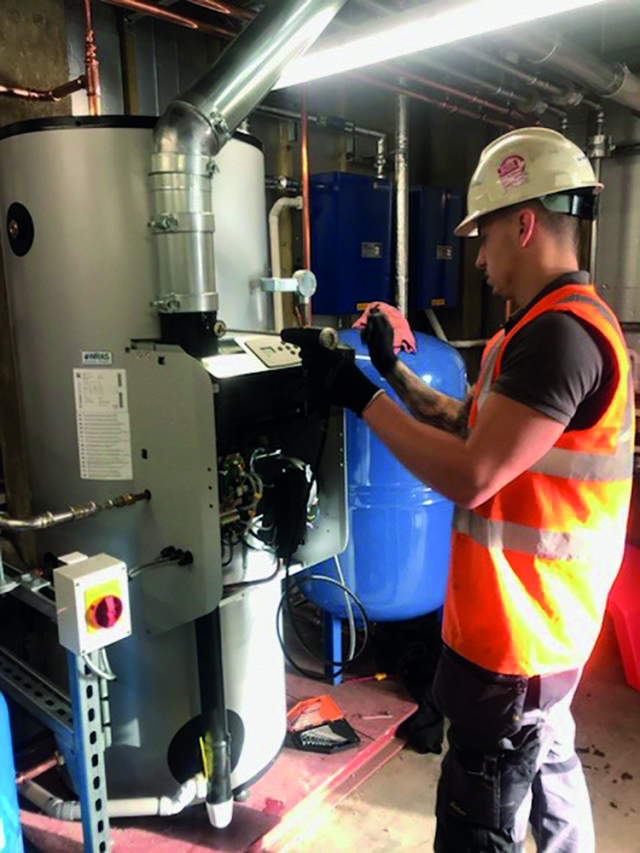A mission to commission

The habit of stealing time out of the commissioning period to make up for delays earlier in a project regularly undermines the overall design intent, says Lochinvar’s Paul Mitchell.
In a research project carried out by the government’s innovation agency Innovate UK, it emerged that many buildings – including newly constructed, highly modern facilities – “routinely” used 3.5 times the amount of energy they should. They also produced carbon emissions that were, on average, 3.8 times higher than predicted.
The study of 49 non-domestic buildings, which included supermarkets, offices, schools and health centres, was a stark illustration of how a series of incremental steps can knock a good design off course leaving the end-user with a finished product that performs below expectations.
This ‘performance gap’ is undermining efforts to reduce energy, but there are signs of change. Ambitious low carbon targets and greater awareness of the impact of buildings on occupant health and wellbeing has raised the profile of the work of the building services sector. It has also highlighted the important role of the commissioning specialist in making sure the installation is set up correctly and, therefore, will continue to perform well throughout its operating life.
However, on many projects the time set aside for commissioning becomes squeezed as the timetable overruns. Other project team members keep stealing back days in order to meet their own targets, which makes it increasingly hard for the commissioning team.
Comprehensive
In addition, commissioning is not just a ‘tail end Charlie’ task. It needs to be considered from the outset so that easy access to the equipment is included in the design and comprehensive technical information is passed on to the commissioning team. This not only helps with the handover process, but also means the pieces are in place for ongoing service and maintenance to support better long-term building performance.
A more joined up process is more important than ever because commissioning engineers are being asked to carry out increasingly complex tasks. We are also at the forefront of the low carbon heat market with the use of heat pumps growing rapidly and both central and local government investing heavily in heat networks. How can we ensure all of these developments actually deliver what they promise unless they are fully commissioned and continually monitored?
The commissioning engineer is often expected to take on an integration role to ensure different technologies work in harmony. Continuous commissioning should also be a serious consideration; particularly for the lifecycle of complex and high risk buildings.
Working with the manufacturer is a good way of achieving commissioning aims because they have intimate knowledge of their products and their commissioning engineers will already have experienced most of the technical challenges they are likely to meet.
This allows them to quickly solve any operating problems, which can help mitigate some of the problems created by squeezed commissioning periods, and ensure the system is set up to perform well throughout its operating life.

For example, the service and commissioning team at Lochinvar is able to set up boilers and water heaters to operate at maximum efficiency from day one and can spot potential problems quickly because of their detailed knowledge. They will also issue a commissioning report, which is a valuable resource for facilities managers charged with keeping the system operating close to optimum throughout the building’s lifecycle. Our engineers are also able to assist on-site staff with the long-term operation of the equipment, including some targeted training.
The ability to closely match boilers and water heaters to predicted demand is an essential part of any modern energy saving strategy. It is no longer acceptable to design for peak demand plus a generous margin for error because of the legacy of energy waste this builds into the system.
However, it is equally important that the system specified is flexible enough to respond to changing usage patterns as the use of the building evolves and is well controlled by making use of features like weather compensation.
Flexibility
The use of modulating burners that make sure the boiler is not just either on or off; variable speed drives that ramp up and down depending on demand; systems that can accept energy from different sources – such as a combination of gas and renewables – all build flexibility into a system without exposing the end user to excessive costs. This should ensure reduced long-term running costs and extended operating life, but only if the system is properly commissioned.
The protection and peace of mind provided by the warranty is another important consideration for an end user. If a manufacturer has been appointed to carry out the commissioning, the warranty period usually starts at that date, but this may not be the case when commissioning is carried out by a third party. In these instances, the manufacturer’s warranty may start from the date the product is supplied.
As buildings become more complex and performance challenges increase, the role of the commissioning engineer will gain greater attention. The secret with increasingly sophisticated solutions is to ensure the sophistication remains behind the scenes and the equipment is relatively simple to operate for the building occupiers; otherwise, the performance will drift over time.
Ultimately, commissioning engineers with detailed product knowledge will be essential to make that ambition a reality and help the sector narrow the performance gap.
Paul Mitchell is service manager for Lochinvar.







